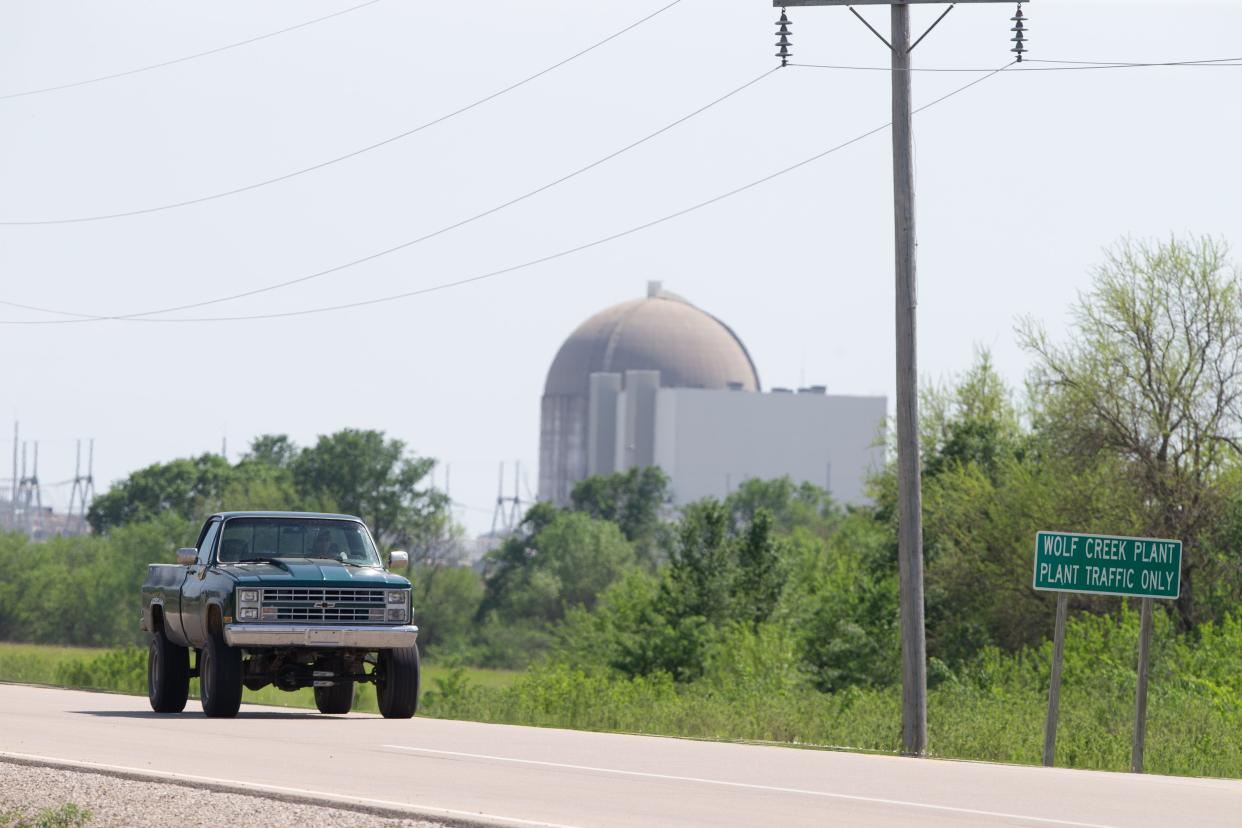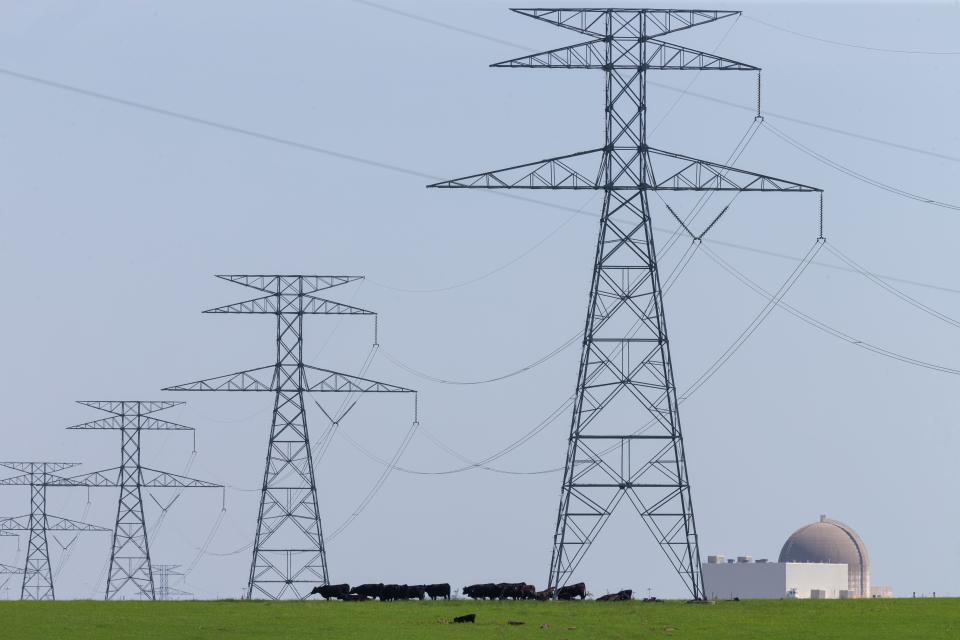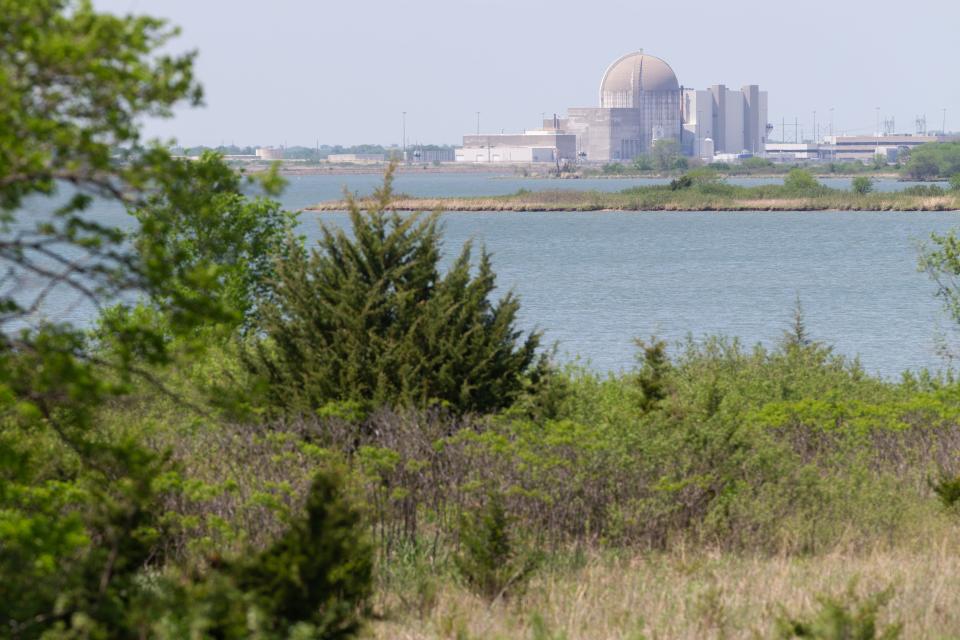Giant electric line taking Kansas nuclear energy to Missouri now has eminent domain power

Builders of a proposed electric line taking nuclear energy from Kansas to Missouri now have eminent domain power, but they will have to wait to use it until the final route is approved.
Regulators say electricity consumers in the state will be better off in the long run from cost savings, despite having to help foot the bill for sending Kansas-produced electricity out of state.
The Kansas Corporation Commission granted public utility status to NextEra Energy Transmission Southwest, which plans to build a 94-mile, 345-kilovolt transmission line from the Wolf Creek nuclear power plant near Burlington to the Blackberry Substation in Missouri.
Now that NextEra has a certificate of convenience and necessity, it has eminent domain powers. But it can't use them until the route is approved, which is expected to run through Coffey, Anderson, Allen, Bourbon and Crawford counties.
Instead of a longer route following highways in southeast Kansas, the proposal crosses large swaths of farmland, making it a shorter distance to the station near Joplin, Mo.
Several landowners objected to the power lines, which would require a 150-foot easement, during the regulatory proceedings.
Anderson County farmer Mike Welding testified that he has no intention of allowing NextEra agents onto his property or to sign the easement contract.
More: Proposed transmission line in southeast Kansas could say a lot about the Plains' energy future
Allen County farmer Brian Regehr testified that NextEra agents had already trespassed on his property and damaged it, arguing that the company's "disregard for my property rights" should be reason to block the project.
Rochelle McGhee Smart, an Anderson County farmer and rancher, testified that her operations will suffer.
"Those poles, as with any in-field obstacle, make farming much more challenging," she said. "You lose the productivity on the ground where Nextera wants to place the physical infrastructure and the land in its immediate vicinity."
The KCC acknowledgement of landowner eminent domain concerns largely passed the buck to lawmakers.
"The legislature granted public utilities the power of eminent domain, and the Commission is not the correct forum to address these concerns," the KCC order said.
Why is the power line being built, who pays for it and who benefits?

Federal regulators at the Federal Energy Regulatory Commission mandate that the Southwest Power Pool, which covers Kansas and other 16 states in the region, to provide reliable supplies of power, adequate transmission infrastructure and competitive wholesale prices.
The SPP identified the transmission line as a necessary economic project to increase transmission capability and relieve congestion. The power pool awarded the project to NextEra, a publicly traded corporation based in Florida.
It is expected to cost $85 million.
The entire SPP region will contribute, with Kansas paying 16.5% of the cost. While the energy is being transmitted out of Kansas, it is expected to remain in the SPP.
The idea is that energy would be more efficiently allocated by sending nuclear power to the southwest Missouri substation while Wichita, Kansas City and other population centers in eastern Kansas rely more heavily on wind energy from western Kansas.
More: Hackers in Russian spy agency's military unit targeted Kansas nuclear power plant, FBI alleges
"As a result, the Project will maximize Kansas energy resources to the benefit of all SPP customers," NextEra said in its application.
The dispute didn't center around whether the power line would be beneficial to the region, but whether it benefits Kansas, which is required by state law.
The KCC believes it "will have a beneficial effect on customers by lowering overall energy costs, removing inefficiency, relieving transmission congestion and improving the reliability of the transmission system."
An average Kansas customer could pay 4 to 5 cents per month to help pay for building the power line, said Justin Grady, a KCC fiscal expert. Over the 40-year operating life of the project, benefits to consumers are projected to be a reduction of $4 to $7 for every dollar spent on the line.
The Kansas Industrial Consumers Group challenged those estimates.
The KIC cited SPP's own study, which made no Kansas-specific findings on the necessity or benefits of the lines. Further, the SPP witness testified "that it was not possible to identify Kansas specific benefits, and any attempt to do so would be questionable as to its accuracy," KIC said.
The group also argued that western Kansas consumers, who currently have abundant low-cost generation primarily from wind, will pay more for energy.
Jim Zakoura, counsel for the Kansas Industrial Consumers Group, said they are disappointed.
"Retail electric ratepayers in Kansas continue to experience large increases in electric transmission expenses," Zakoura said, noting the energy cost burden on residential customers, businesses, schools, religious buildings and medical facilities.
"We believe the Legislature, Governor's Office, the KCC and stakeholders need to jointly determine a transmission policy for Kansas that allows for the responsible development of renewable energy without placing unnecessary costs on overburdened ratepayers," he said.
More: Kansas lawmakers want Joe Biden to ban Russian oil. The president already did.
KCC imposition could change route

The commission imposed additional requirements on NextEra, including reporting requirements and a financial guarantee.
"While granting the certificate, the Commission imposed additional requirements and conditions on NextEra designed to protect ratepayers and to explore ways to minimize the impact of landowners along the proposed route."
Those include reporting requirements and a financial guarantee, but the most significant condition could affect the route.
That condition requires NextEra to evaluate the feasibility of a double circuit line with an existing 25-mile, 161-kilovolt Evergy transmission line, which would require less easement and reduce structure costs.
KCC warned that failure to explore the option could result in the project getting blocked.
"The public interest of Kansans, especially including the landowners that would be affected along this portion of the preliminary route of the line, will not be served if this issue is not comprehensively reviewed by all parties before NEET Southwest files its line siting request with the Commission," the KCC order said. "To reiterate, failure to earnestly and completely review the double circuit option may result in a proposed route that the Commission cannot approve as reasonable, which the Commission wishes to avoid."
Jason Tidd is a statehouse reporter for the Topeka Capital-Journal. He can be reached by email at jtidd@gannett.com. Follow him on Twitter @Jason_Tidd.
This article originally appeared on Topeka Capital-Journal: Kansas grant NextEra Energy eminent domain for power transmission line

